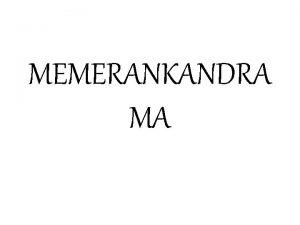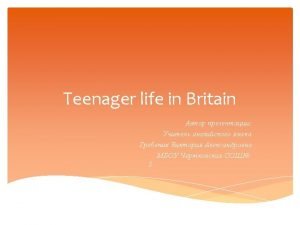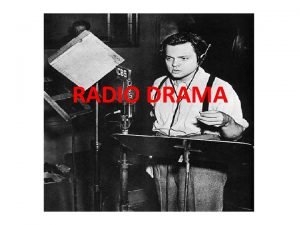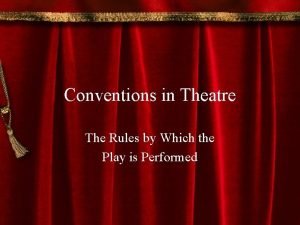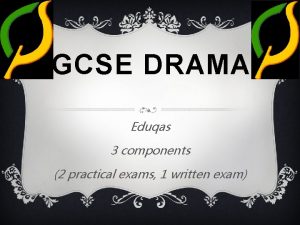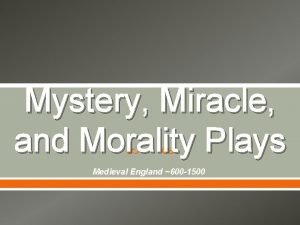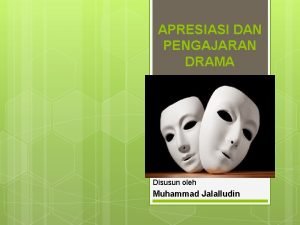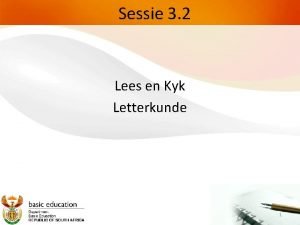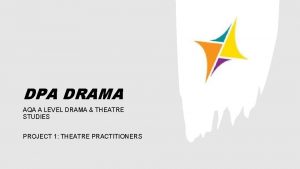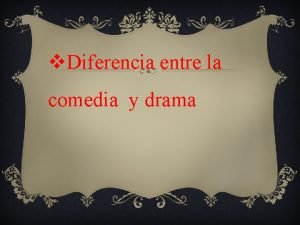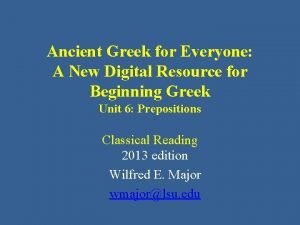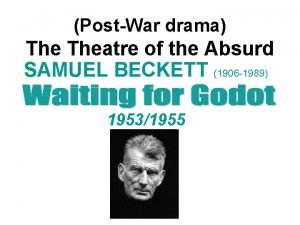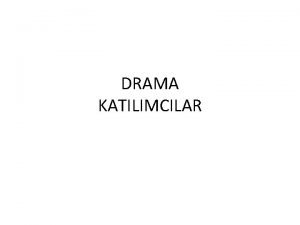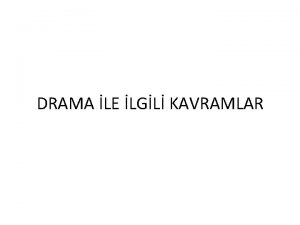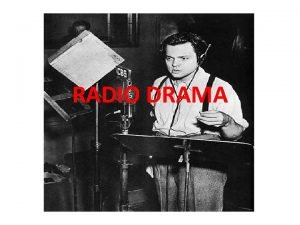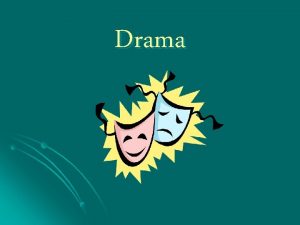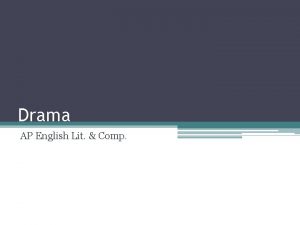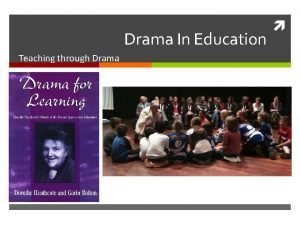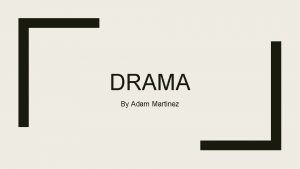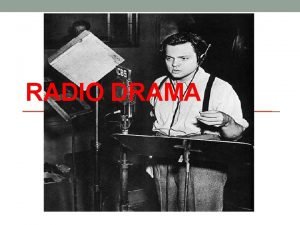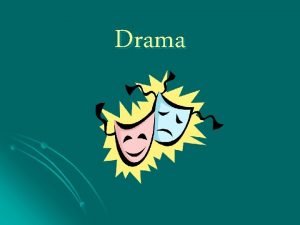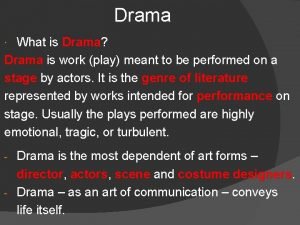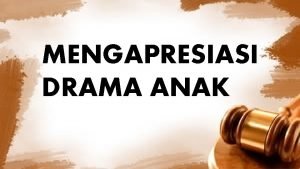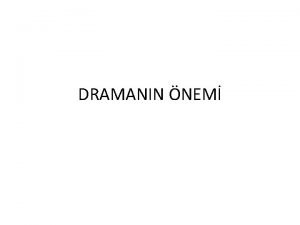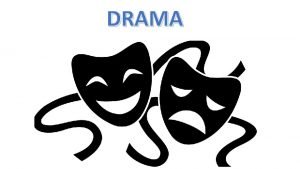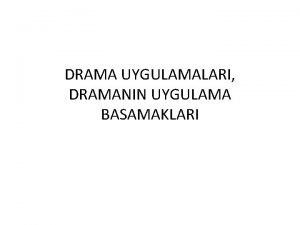Drama What Is Drama A drama is a




























- Slides: 28

Drama

What Is Drama? A drama is a story enacted onstage for a live audience.

What Is Drama? l The word drama comes from the Greek verb dran, which means “to do. ” l The earliest known plays. . . l l were written around the fifth century B. C. produced for festivals to honor Dionysus, the god of wine and fertility

What is a play? A play is a representation of human beings “in action. ” But “action” does not mean mere physical movement; it includes psychological motivations that lie behind visible behaviour. The dramatic action incorporates what is actively done and the purpose for which it is done

Origin of Drama l 1 - The Primitive Drama: * Religious in nature l Struggle between life and Death l * actors l * audience: whole tribe l * open place, outside l * directors: people to guide them l

Tragedy A tragedy is a play that ends unhappily. • Most classic Greek tragedies deal with serious, universal themes such as right and wrong justice and injustice life and death • Tragedies deal with human limitations against the larger forces of destiny.

Tragedy The protagonist of most classical tragedies is a tragic hero. This hero • is noble and in many ways admirable • has a tragic flaw, a personal failing that leads to a tragic end pride rebelliousness jealousy

Comedy A comedy is a play that ends happily. The plot usually centers on a romantic conflict. boy meets girl boy loses girl boy wins girl

Comedy The main characters in a comedy could be anyone: nobility townspeople servants

Comedy • Comic complications always occur before the conflict is resolved. • In most cases, the play ends with a wedding.

2 -The Medieval Drama in England began in the church. l * Liturgical Plays( public worship); short playlets, 4 lines with 4 priests as actors, inside the church, stories from Bible. l l * Mystery plays (Miracle Plays) l Bible stories or events from lives of saints, miracles of Prophets. l

2 -The Medieval Drama * Morality plays: religious in intention, but concerned with the lives of ordinary people *Interludes: short plays presented between acts of long morality plays.

3 -The Elizabethan Drama The Golden Age *Inn yards: traveling actors *Fear of plague, Puritan objection *The Globe, centre open to the sky, octagonal( eight angles& sides) *1642 Puritans closed theatres

Theatres


Elizabethan Stage. • .

Setting the Stage “In the round” stage is surrounded by an audience on all sides.

Setting the Stage Proscenium stage • The playing area extends behind an opening called a “proscenium arch. ” • The audience sits on one side looking into the action. upstage right stage left downstage

Setting the Stages in Shakespeare’s time were thrust stages.

Setting the Stage Scene design transforms a bare stage into the world of the play. Scene design consists of • sets • lighting • costumes • props

Setting the Stage A stage’s set might be realistic and detailed abstract and minimal

Setting the Stage A lighting director skillfully uses light to change the mood and appearance of the set.

Setting the Stage The costume director works with the director to design the actors’ costumes. • Like sets, costumes can be detailed minimal

Setting the Stage Props (short for properties) are items that the characters carry or handle onstage. • The person in charge of props must make sure that the right props are available to the actors at the right moments.

The Characters The characters’ speech may take any of the following forms. Dialogue: conversations of characters onstage Monologue: long speech given by one character to others Soliloquy: speech by a character alone onstage to himself or herself or to the audience Asides: remarks made to the audience or to one character; the other characters onstage do not hear an aside

The Audience Finally, a play needs an audience to experience the performance understand the story respond to the characters

The End

This powerpoint was kindly donated to www. worldofteaching. com http: //www. worldofteaching. com is home to over a thousand powerpoints submitted by teachers. This is a completely free site and requires no registration. Please visit and I hope it will help in your teaching.
 Drama berasal
Drama berasal Dramaserial semi
Dramaserial semi Drama türleri
Drama türleri Define radio drama
Define radio drama Dreaded drama triangle
Dreaded drama triangle Serious gaming drama
Serious gaming drama Characteristics of the elizabethan theatre
Characteristics of the elizabethan theatre Target audience radio
Target audience radio Theatre conventions definition
Theatre conventions definition Drama eduqas gcse
Drama eduqas gcse El amor prohibido de ollantay
El amor prohibido de ollantay Miracle and morality plays in english literature
Miracle and morality plays in english literature Are drama queens narcissists
Are drama queens narcissists Naskah drama musikal disusun oleh
Naskah drama musikal disusun oleh Test epika liryka dramat
Test epika liryka dramat Kort drama opvoerings
Kort drama opvoerings A poem tells a story
A poem tells a story Duplo and karagatan
Duplo and karagatan Bbc bitesize stanislavski
Bbc bitesize stanislavski Nggrantes tegese
Nggrantes tegese Teater secara etimologis berarti
Teater secara etimologis berarti A long uninterrupted speech by one character
A long uninterrupted speech by one character Vocal techniques
Vocal techniques Three types of medieval drama
Three types of medieval drama Diferencias entre la comedia y el drama
Diferencias entre la comedia y el drama Examples of digital drama
Examples of digital drama Oldest surviving greek drama
Oldest surviving greek drama Que significa drama
Que significa drama Post war drama
Post war drama
